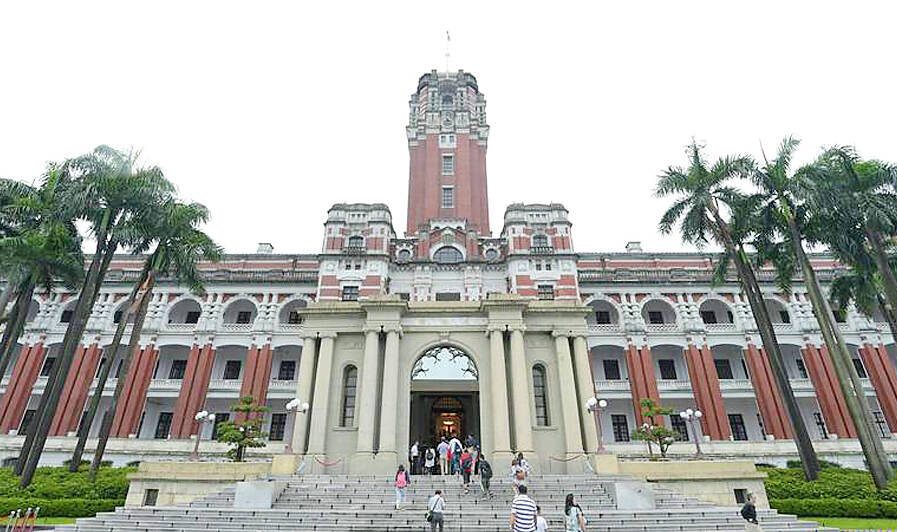The Supreme Court on Friday upheld espionage charges against two military officers who formerly served as presidential guards, but reduced their sentences.
Judges found that retired military officer Sun Han-fang (孫翰方) and his nephew, Wang Wen-yen (王文彥), a former officer at the National Security Bureau’s Special Service Center, guilty of contravening the National Security Act (國家安全法) and Criminal Code of the Armed Forces (陸海空軍刑法), for spying and passing to Chinese intelligence officials an itinerary of President Tsai Ing-wen (蔡英文).
The High Court in 2021 sentenced Sun to three years and four months in prison, and Wang to one year and 10 months.

Photo: Taipei Times file
The Supreme Court reduced Sun’s prison term to two years and two months, and Wang’s to one year and four months.
In their ruling, the judges reprimanded the pair for undermining national security after having served as military officers.
The judges said there was sufficient evidence that the duo had obtained classified materials related to the Presidential Office.
They said their prison terms were reduced because there was no definitive proof that they had obtained and passed on to China the itineraries of Tsai, and US and Japanese politicians who visited Taiwan and met with her in 2018.
Sun was recruited from the military to work at the Presidential Office’s Department of Security Affairs, and served as a guard for former presidents Chiang Ching-kuo (蔣經國) and Lee Teng-hui (李登輝).
When he retired in 1991, Sun was a lieutenant colonel. He became chief secretary for then-Chinese Nationalist Party (KMT) lawmaker Wu Ke-ching (吳克清), before going to Guangzhou, China, in the early 2000s, where he worked as an administrative secretary for a law firm specializing in handling cross-strait regulations for businesses, prosecutors said.
A Chinese intelligence official surnamed Fang (方) met Sun at social events organized by the Taiwanese business community in Guangzhou, promising to pay him up to US$3,000 for confidential military materials, and to organize a tour in China for active members of Taiwan’s military, the ruling said.
On a trip back to Taiwan, Sun persuaded Wang to access confidential material about the president’s security detail, the ruling said.
Investigators found that Wang started spying in 2008, and was able to obtain the personal files of commanding officers and the on-duty rotation schedule of presidential security guards, during the tenures of former presidents Chen Shui-bian (陳水扁) and Ma Ying-jeou (馬英九).
Wang was promoted to lead one of the Military Police Command’s security guard units when Tsai began her first presidential term in 2016.
Sun instructed Wang to procure confidential material, including the names, ranks, job descriptions and contact information of officers responsible for security arrangements at the Presidential Office, as well as the on-duty security rotation schedule, the ruling said.
Wang received payments for obtaining these confidential materials, and Sun treated Wang to trips to Bali, Singapore and South Korea from 2008 to 2016, it said.

Beijing could eventually see a full amphibious invasion of Taiwan as the only "prudent" way to bring about unification, the US Department of Defense said in a newly released annual report to Congress. The Pentagon's "Annual Report to Congress: Military and Security Developments Involving the People's Republic of China 2025," was in many ways similar to last year’s report but reorganized the analysis of the options China has to take over Taiwan. Generally, according to the report, Chinese leaders view the People's Liberation Army's (PLA) capabilities for a Taiwan campaign as improving, but they remain uncertain about its readiness to successfully seize

Taiwan is getting a day off on Christmas for the first time in 25 years. The change comes after opposition parties passed a law earlier this year to add or restore five public holidays, including Constitution Day, which falls on today, Dec. 25. The day marks the 1947 adoption of the constitution of the Republic of China, as the government in Taipei is formally known. Back then the Chinese Nationalist Party (KMT) governed China from Nanjing. When the KMT, now an opposition party in Taiwan, passed the legislation on holidays, it said that they would help “commemorate the history of national development.” That

Taiwan has overtaken South Korea this year in per capita income for the first time in 23 years, IMF data showed. Per capita income is a nation’s GDP divided by the total population, used to compare average wealth levels across countries. Taiwan also beat Japan this year on per capita income, after surpassing it for the first time last year, US magazine Newsweek reported yesterday. Across Asia, Taiwan ranked fourth for per capita income at US$37,827 this year due to sustained economic growth, the report said. In the top three spots were Singapore, Macau and Hong Kong, it said. South

Snow fell on Yushan (Jade Mountain, 玉山) yesterday morning as a continental cold air mass sent temperatures below freezing on Taiwan’s tallest peak, the Central Weather Administration (CWA) said. Snowflakes were seen on Yushan’s north peak from 6:28am to 6:38am, but they did not fully cover the ground and no accumulation was recorded, the CWA said. As of 7:42am, the lowest temperature recorded across Taiwan was minus-5.5°C at Yushan’s Fengkou observatory and minus-4.7°C at the Yushan observatory, CWA data showed. On Hehuanshan (合歡山) in Nantou County, a low of 1.3°C was recorded at 6:39pm, when ice pellets fell at Songsyue Lodge (松雪樓), a